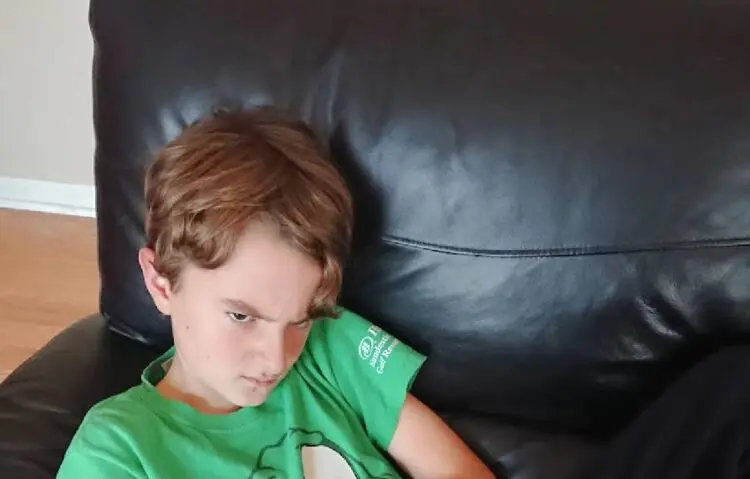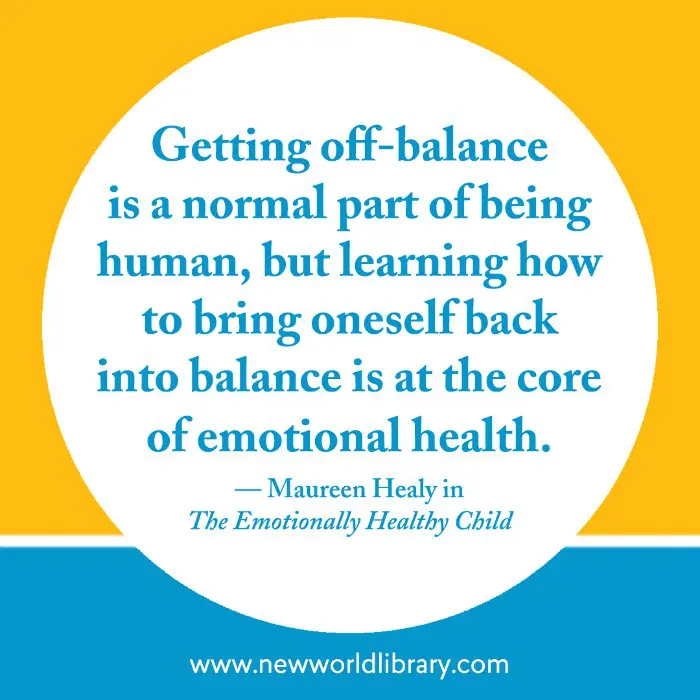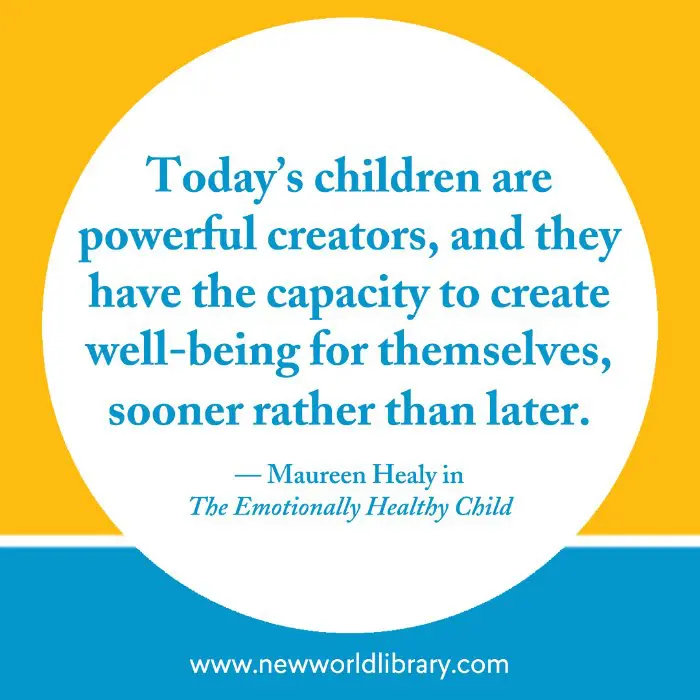Dealing with an angry child can be challenging. You want to keep your cool and help the child learn to deal with their anger in an appropriate way. That is why I am so pleased to be able to share some expert tips for anger management for kids from Maureen Healy’s book, “The Emotionally Healthy Child: Helping Your Child Calm, Center, and Make Smarter Choices” (New World Library, October 9, 2018). She offers constructive methods of dealing with angry kids and helps with what role the parent should play in helping a child process their anger in a healthy way. I will also share some helpful questions to ask an angry child and we will discuss making them happy again.
Anger Management For Children
Angry outbursts and aggressive behavior can be hard to handle. In “The Emotionally Healthy Child” (affiliate link), Healy explains that emotional health is the ability to make better choices, even when feeling anger or another big emotion. Healy shows readers steps to take for anger management for kids and exactly how to implement them. She shares that best ways that parents can help children find equilibrium in the moment and build emotional well-being over the long-term.
With the National Institute of Mental Health reporting that 25 percent of children experience anxiety and 14 percent have a mood disorder, Maureen Healy’s new book is perfectly timed. Maureen Healy is the author of The Emotionally Healthy Child and Growing Happy Kids, which won the Nautilus and Readers’ Favorite book awards in 2014. A popular Psychology Today blogger and sought-after public speaker, Maureen runs a global mentoring program for elementary-aged children and works with parents and their children in her busy private practice. I hope you’ll enjoy this excerpt from her book. Remember that this is for educational purposes but there is absolutely no shame if you need professional help dealing with a child’s anger and big feelings. Often times addressing small problems helps keep them from becoming big problems.
PARENTING AN ANGRY CHILD
Excerpted from the book The Emotionally Healthy Child. Copyright ©2018 by Maureen Healy. Reprinted with permission from New World Library.
# # #
A young child can become irate because she got the smallest piece of pizza, while an older child can become annoyed when you ask to see the homework that is due the next day. Boys and girls who run hot can get angry sometimes for the smallest of reasons. Some common childhood triggers, especially for hot-running children, are:
- unfairness
- having no choices (being told, “You must do your homework now.”)
- impatience (having to wait in lines)
- being talked down to
Although the young child’s pizza slice may not have been the smallest, her perception was that it was. It’s a child’s perception that spurs him or her to feel frustrated, annoyed, agitated, and ultimately angry. When you help a child who chronically sees the negative side of things shift her perspective to a more positive mindset, you’re helping to reduce her anger in the long term, too.
Of course, the biggest challenge with anger is its speed. There are often only a few seconds between when a child feels slighted and when the screaming begins. But if we can lengthen the space between stimulus and response, the child who supposedly got the smallest piece of pizza can take a breath and then respond differently. She can learn to calm herself and respond from that calmer place instead of simply running on automatic.
By bringing the thinking portion of her brain (left side) online sooner, she can stop before reacting and demonstrate some impulse control. While learning how to do this doesn’t usually happen overnight, your child can practice becoming more aware of her feelings and learn to slow down instead of making a not-so-smart choice when she’s angry.
Dealing With Anger: In the Moment
In the moment of anger, children need your presence to serve as a soothing balm to their blistering anger. Of course, we’re not perfect in every moment, but that’s not our aim; it is to be a refuge for our children, not to take what they say personally or to add fuel to the fire, which is all too easy to do.
But if we can learn how to calm ourselves and be that calming presence for our children, then they can learn to handle their anger constructively. In the moment of anger, your angry children need you to be:
- Present. Simply be present. You might say to your child, “I’m here for you.”
- Calm. Children need to know that everything is going to be okay. The anger will pass, and sometimes we just need to be patient and let a little time go by. You might say, “Let the angry clouds pass” or “This too shall pass.”
- Constructive. Children need an outlet for their anger, whether that is writing in a journal, building a complex Lego project, or talking to a friend. One of my child clients, Marcos, would go jogging when he got angry, which made him feel a world better. Another client, Kimmy, would hit the punching bag in her basement, which immediately lessened her anger. Guiding your children to make a constructive choice when angry is the work.
Patience is an antidote to anger, so if your son or daughter can muster some self-control even when angry and allow the angry clouds to pass, he or she will begin feeling some relief soon. It takes practice to stop oneself when angry, but I’ve seen young children take deep breaths and patiently wait for their anger to subside.
Children are also helped by having parents or caregivers who are good anger-management role models. They not only tell children what to do but show them how to manage their anger. Children who grow up in families that manage their anger smartly tend to do the same. As discussed earlier, their mirror neurons kick in, and they learn by observing what we do and oftentimes mimicking it.
# # #
Thanks again to Maureen Healy sharing an excerpt from her book, The Emotionally Healthy Child.

Questions To Ask An Angry Child
When a child is angry, asking the right questions can help them process their emotions and feel heard. Here are some thoughtful questions to ask, along with why they help:
1. “What happened that made you feel this way?”
Why: This helps the child express the root of their anger rather than just reacting to it.
2. “How does your body feel when you’re angry?”
Why: Encourages body awareness and helps them recognize signs of escalating emotions.
3. “What would make you feel better right now?”
Why: Shifts the focus to solutions rather than just the problem.
4. “Do you want to talk about it now, or do you need some time?”
Why: Respects their need for space while reinforcing that you’re available when they’re ready.
5. “If you could change one thing about what happened, what would it be?”
Why: Encourages problem-solving and helps them regain a sense of control.
6. “What’s a safe way we can let your anger out?”
Why: Teaches healthy coping mechanisms, like deep breathing, drawing, or going for a walk.
7. “Can you help me understand what you need right now?”
Why: Validates their feelings and encourages self-advocacy.
8. “Is there something you want me to do differently next time?”
Why: Helps build trust and lets them know their feelings matter.
9. “What would you say to a friend who felt the same way?”
Why: Encourages empathy and helps them gain a new perspective on their emotions.
10. “Can we work together to find a solution?”
Why: Reinforces teamwork and emotional regulation skills.
How To Make An Angry Child Happy
Often times parents wonder how to make an angry child happy. To this, I would say, that should not be your primary goal. First, focus on validating their feelings. Before trying to cheer them up, acknowledge their emotions:
“I see you’re really upset. It’s okay to feel that way.”
“Do you want to talk about it or take a break first?”
Acknowledging their feelings helps kids feel heard instead of dismissed. It also lets them know it is natural and ok for them to have feelings but that they need to learn a positive coping skill to deal with the anger. Helping an angry child feel happy again requires patience, validation, and positive engagement. Offer them space to cool down and encourage deep breathing or share a coping skill. Help them problem solve. (Don’t do it for them- help them using the questions above.)
End on a positive note. Once they’re feeling better, reinforce emotional awareness:
“I’m proud of you for calming down.”
“What can we do next time when you feel angry?”
Conclusion
Rather than suppressing their emotions, kids need healthy ways to express and regulate their anger. By validating their feelings, teaching coping strategies, and modeling positive behavior, caregivers can help children develop emotional intelligence and self-control.
Providing safe outlets, such as deep breathing, creative activities, or physical movement, allows children to process their emotions in a constructive way. Additionally, fostering open communication and problem-solving skills helps them understand their triggers and find solutions rather than reacting impulsively.
Ultimately, helping a child manage anger is not about eliminating the emotion but teaching them how to handle anger effectively. With consistent support, children can grow into emotionally resilient individuals who can navigate frustration in a healthy, balanced way.
Do you show empathy when your children are angry? If you enjoyed these tips for anger management for kids, be sure to get a copy of The Emotionally Healthy Child by Maureen Healy because it is full of helpful parenting tips! Have you been trying to deal with anger management for kids? Let us know how these tips work for you!
Related Posts:
Parenting Tips For Bringing Up Boys



Kami | Life with Kami says
Thank you effective ways for how parents can help younger children with anger issues. I will definitely grab a copy of your books. Angry feelings and negative emotions are always tough to handle.
john grey says
Such a valuable and timely topic! Parenting an angry child can be challenging, but these tips on anger management can really make a difference. Understanding triggers, teaching healthy coping strategies, and creating a calm environment are key to helping kids manage their emotions. This could be a great resource for parents looking for support and guidance!
Richie says
Your blog post was exactly what I needed to hear today. Parenting an angry child can be really challenging, but understanding the underlying causes of their big emotions is the most important thing. Instead of reacting to their angry responses, it helps to acknowledge their negative feelings and teach them healthy ways to express themselves. I love the idea of using anger thermometers to help young people recognize their emotions before they escalate. With a small child, patience and modeling calm behavior can make a big difference. The best thing we can do as parents and family members is to support and guide them through their child’s behavior with empathy and consistency.
Consuelo says
Your blog post was a real eye-opener for me. Thank you for challenging my preconceived notions and expanding my worldview. I will use these tips as I work on controlling my own emotions and angry behaviors as well. Your engaging content and practical advice make this a go-to platform for me as a parent seeking fun ideas and guidance.
Winnie says
Your blog has quickly become one of my favorites. Your writing is both insightful and thought-provoking, and I always come away from your parenting blog posts feeling inspired. I really appreciated your suggestions on how to deal with anger in children. Keep up the phenomenal work!
Noem says
Your writing is not only informative but also incredibly inspiring. You have a knack for sparking curiosity and encouraging critical thinking. I like that you shared effective strategies for dealing with anger but also for understanding more where it is coming from and why they are expressing it that way. Thank you for being such a positive influence!
Oliver says
This blog is really helpful! Parenting an angry child can be so tough, but these tips are easy to follow and make a lot of sense. I love the idea of focusing on the cause of their anger rather than just the behaviour. It’s a great reminder to stay calm and teach them how to manage their emotions. I also appreciate the advice on encouraging communication—it’s something I’ll definitely try more. This has given me some new strategies to use when things get heated at home.
Milk Snob says
Helping little ones navigate big emotions is so important! Creating a calm and comforting environment can make all the difference. A cozy lovey or security blanket can provide a sense of security during tough moments, giving kids a safe way to self-soothe. Thanks for sharing these valuable tips!